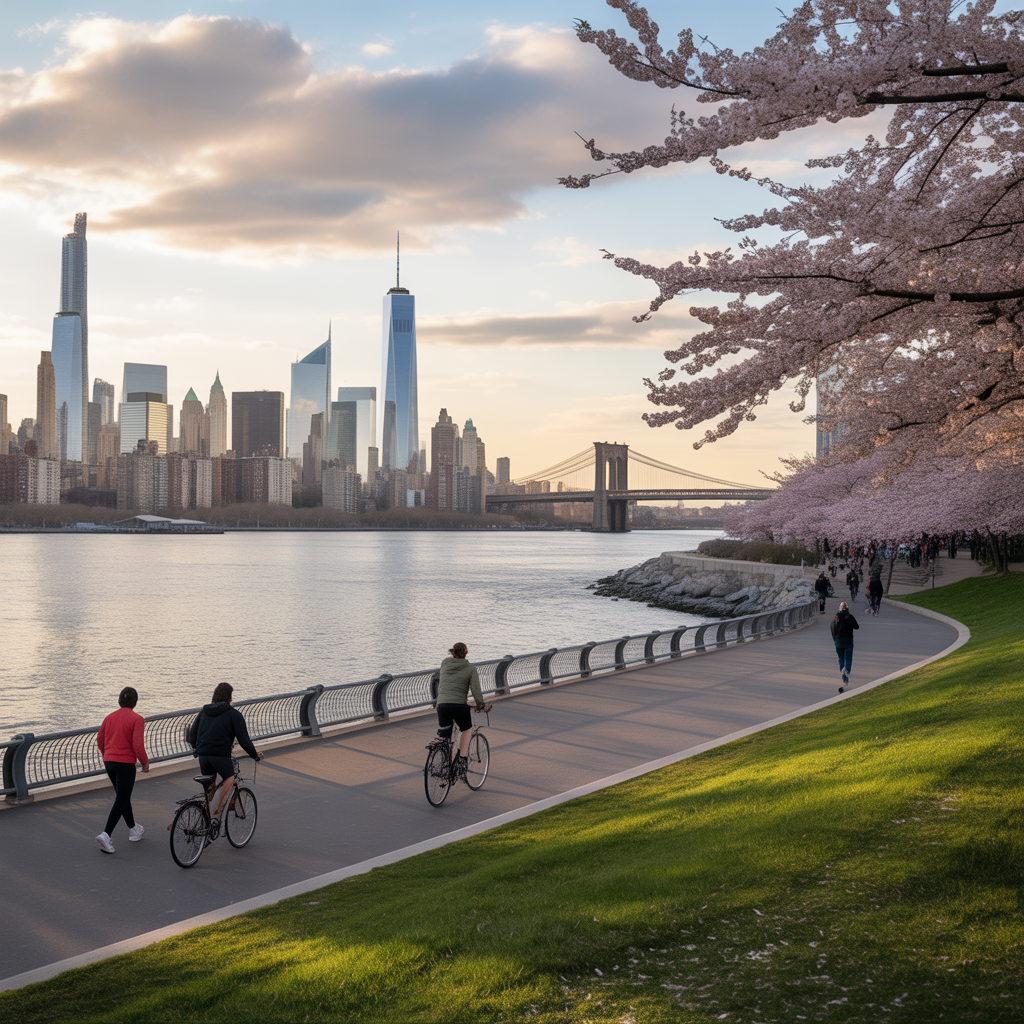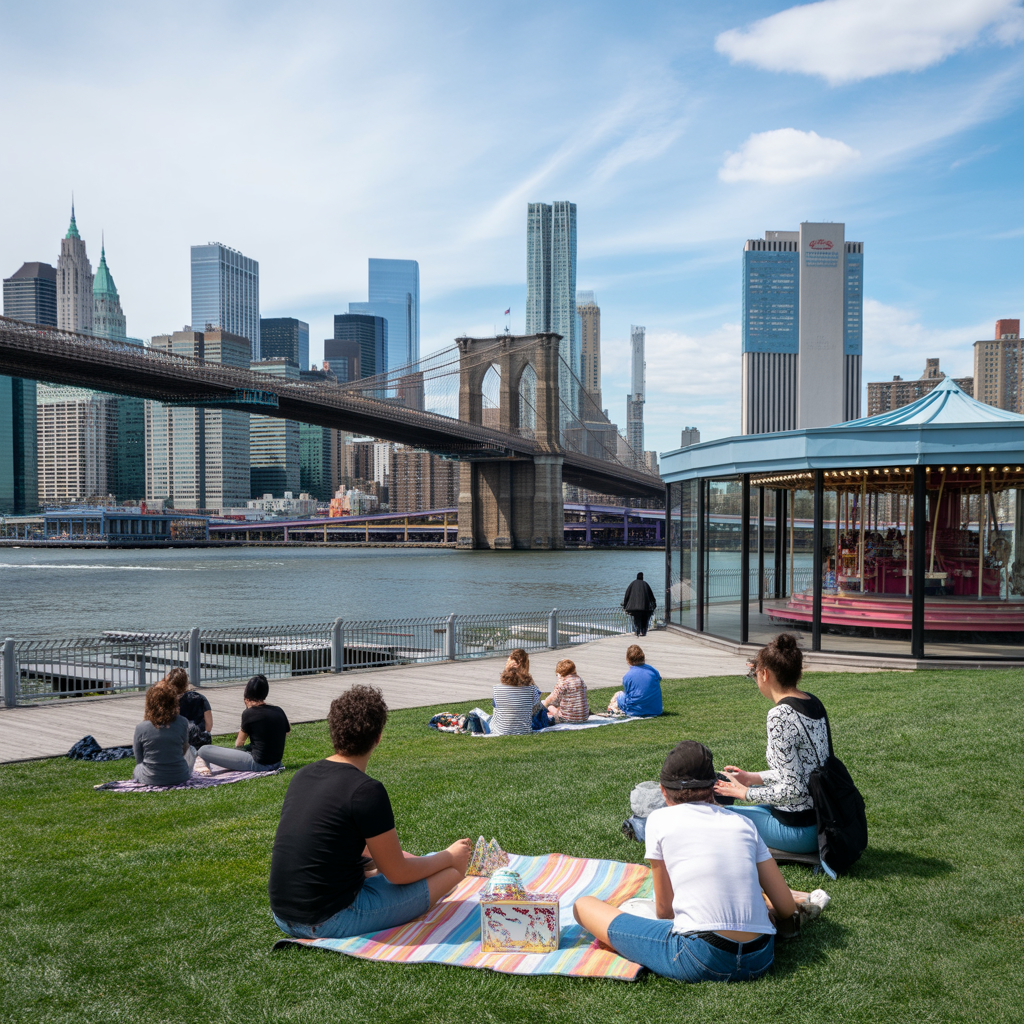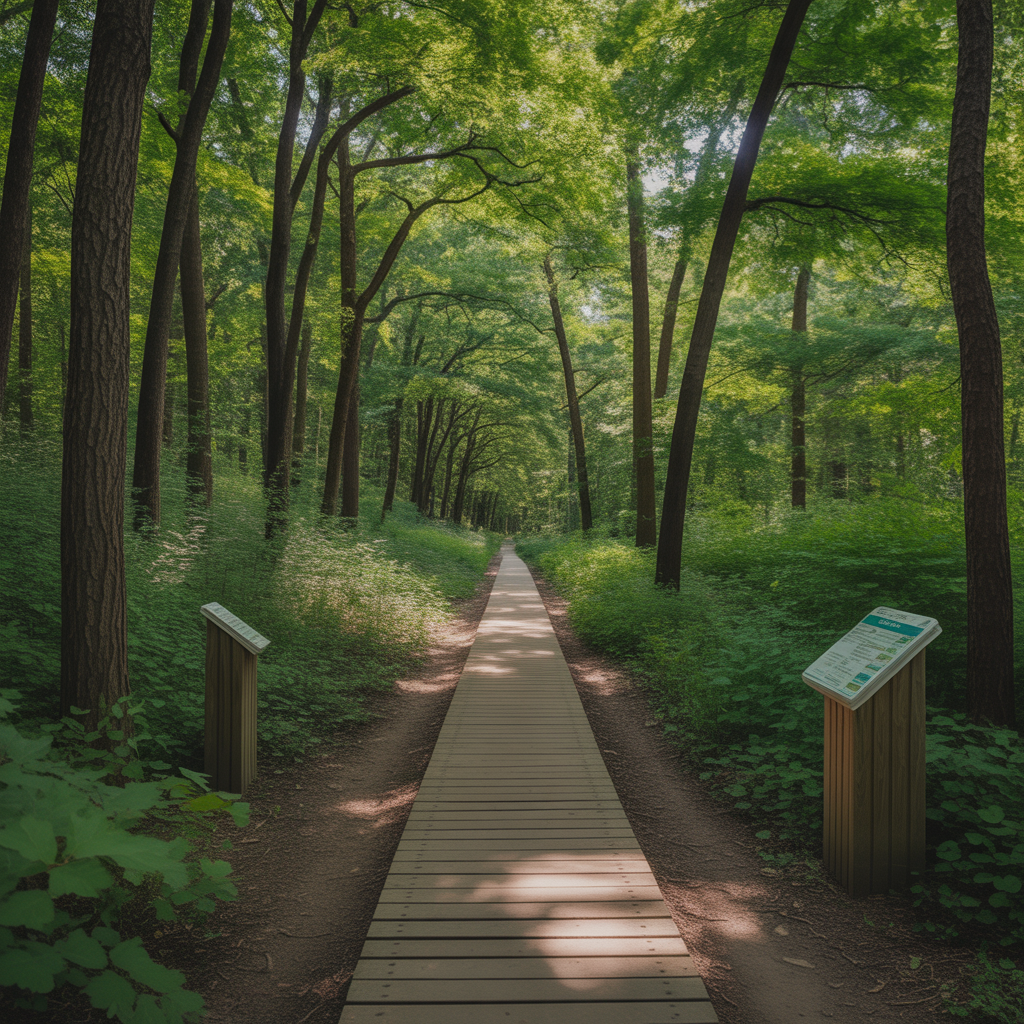While Central Park may steal the spotlight, New York City boasts over 1,700 parks and green spaces that offer equally stunning experiences without the overwhelming crowds. From elevated gardens floating above busy streets to waterfront oases with breathtaking skyline views, NYC’s diverse ecosystem of parks provides endless opportunities for relaxation, recreation, and discovery. Whether you’re seeking a peaceful morning jog, family-friendly activities, or unique photography backdrops, these hidden gems will transform your understanding of what makes the Big Apple truly green.
Manhattan’s Hidden Green Gems
Riverside Park
Stretching along Manhattan’s west side from 72nd to 158th Street, Riverside Park offers spectacular Hudson River views and a refreshing escape from urban intensity. Designed by Frederick Law Olmsted in the 1870s, this 330-acre linear park features winding paths, historic monuments, and diverse recreational facilities that make it a local favorite.
The park’s crown jewel is the Hudson River Greenway, perfect for cycling and jogging with unobstructed water views. Families love the adventure playground at 77th Street, while the 79th Street Boat Basin provides a unique glimpse into houseboat living. During cherry blossom season in late April, the park transforms into a pink paradise rivaling any destination in the world.

The High Line
Perhaps NYC’s most innovative green space, the High Line transformed a defunct elevated railway into a stunning 1.45-mile linear park. This aerial walkway offers a unique perspective of Manhattan’s Meatpacking District and Chelsea, combining urban design, art installations, and carefully curated plantings that reflect the area’s industrial heritage.
Walking the High Line from Gansevoort Street to 34th Street takes about 45 minutes, but plan for longer stops to appreciate the rotating art exhibitions and architectural marvels surrounding the pathway. Visit early morning or late afternoon to avoid crowds and capture the best lighting for photography. The park’s design incorporates original railway tracks and native plants that once grew wild on the abandoned structure.
Bryant Park
Nestled behind the New York Public Library in Midtown Manhattan, Bryant Park serves as a year-round cultural hub with programming that changes with the seasons. This meticulously maintained 9.6-acre park offers free WiFi, moveable chairs, and a central lawn that hosts everything from outdoor movies to fashion shows.
Winter transforms Bryant Park into a magical wonderland with free ice skating, holiday shops, and warming stations. Summer brings outdoor movie nights and the park’s famous reading room atmosphere. The surrounding area offers excellent dining options, making it perfect for combining a park visit with lunch or dinner in one of NYC’s most vibrant neighborhoods.
Washington Square Park
The beating heart of Greenwich Village, Washington Square Park embodies NYC’s bohemian spirit with its iconic arch, central fountain, and vibrant street life. This 9.75-acre park serves as NYU’s unofficial campus quad while maintaining its role as a gathering place for artists, musicians, and chess enthusiasts.
The Washington Square Arch, completed in 1892, provides a stunning focal point and popular photography backdrop. The park’s chess tables in the southwest corner host serious games year-round, while street performers around the fountain create an ever-changing entertainment landscape. The surrounding historic townhouses and cafes make this area perfect for extended exploration.
Brooklyn’s Diverse Park Landscape
Prospect Park
Frederick Law Olmsted considered Prospect Park his masterpiece, and this 526-acre Brooklyn gem showcases his vision of pastoral beauty within urban settings. Larger and less crowded than Central Park, Prospect Park offers the same high-quality design with a more relaxed atmosphere that locals cherish.
The Long Meadow stretches for 90 acres of uninterrupted green space, perfect for picnics, frisbee, and people-watching. The park’s loop road provides excellent cycling and jogging opportunities, while the Audubon Center at the Boathouse offers nature programs and bird-watching activities. The adjacent Brooklyn Botanic Garden and Brooklyn Museum create a cultural cluster worth planning a full day around.
Brooklyn Bridge Park
Stretching along 1.3 miles of East River waterfront, Brooklyn Bridge Park offers unparalleled Manhattan skyline views while showcasing innovative sustainable design principles. This 85-acre park, built on former shipping piers, demonstrates how industrial spaces can be transformed into world-class recreational facilities.
Each pier offers unique attractions: Pier 1 features playgrounds and picnic areas, Pier 2 hosts basketball and handball courts, while Pier 5 includes soccer fields and a barbecue area. Jane’s Carousel, housed in a stunning glass pavilion, operates year-round and provides magical rides with skyline backdrops. The park’s maintenance is funded through revenue-generating activities, making it a model for sustainable urban park development.

Fort Greene Park
Brooklyn’s first park, Fort Greene Park holds deep historical significance as a Revolutionary War fortification site. The 30-acre hilltop park centers around the Prison Ship Martyrs’ Monument, a 148-foot column commemorating American soldiers who died on British prison ships during the Revolutionary War.
The park’s elevated position provides excellent views of downtown Brooklyn and lower Manhattan. Saturday’s year-round Greenmarket brings fresh produce and artisanal goods, while the surrounding Fort Greene neighborhood offers excellent dining and shopping. The nearby Brooklyn Academy of Music (BAM) makes this area perfect for combining outdoor relaxation with cultural experiences.
McCarren Park
Straddling the border between Williamsburg and Greenpoint, McCarren Park embodies North Brooklyn’s creative energy and community spirit. This 35-acre park features excellent recreational facilities, including one of NYC’s most popular public pools, a running track, and multiple sports fields.
The McCarren Park Greenmarket operates on Saturdays year-round, while summer concerts at the park draw both local residents and visitors. The surrounding neighborhoods offer some of Brooklyn’s best restaurants, bars, and vintage shopping, making McCarren Park an excellent base for exploring North Brooklyn’s cultural scene.
Queens’ Cultural and Natural Diversity
Flushing Meadows Corona Park
The site of two World’s Fairs (1939 and 1964), Flushing Meadows Corona Park preserves important cultural landmarks while serving Queens’ incredibly diverse population. The iconic Unisphere, a 140-foot steel globe, anchors this 897-acre park that hosts world-class museums and recreational facilities.
The Queens Museum houses the famous Panorama of the City of New York, while the New York Hall of Science offers interactive exhibits perfect for families. The park’s diverse recreational facilities reflect its multicultural neighborhood, with cricket fields, soccer pitches, and areas designed for various cultural gatherings and celebrations.
Astoria Park
Queens’ largest park, Astoria Park spans 59.96 acres along the East River with stunning views of the Hell Gate and Triborough Bridges. The park’s Olympic-sized pool, opened in 1936, remains one of NYC’s most popular summer destinations and represents Depression-era public works at their finest.
The park’s running track attracts serious athletes, while its numerous picnic areas make it a favorite for family gatherings and community celebrations. The diverse Astoria neighborhood surrounding the park offers authentic Greek, Middle Eastern, and Latin American dining options, creating perfect opportunities for post-park meals.
Socrates Sculpture Park
This unique 4.5-acre outdoor museum along the East River showcases large-scale contemporary art in a waterfront setting. Former artist Mark di Suvero transformed an abandoned landfill into this innovative space that provides free public access to rotating exhibitions and artist programs.
The park’s commitment to accessibility and community engagement makes it a model for public art spaces. Visitors can enjoy art installations while taking in spectacular Manhattan skyline views, particularly beautiful during sunset. The park’s location in Long Island City places it within walking distance of other cultural attractions and excellent dining options.
The Bronx’s Natural Treasures
Van Cortlandt Park
The Bronx’s largest park at 1,146 acres, Van Cortlandt Park offers diverse ecosystems that feel worlds away from urban life. The park’s cross-country running trails have hosted high school and college championships for decades, while its 18-hole golf course provides affordable recreation with a historic clubhouse.
The Van Cortlandt House Museum, dating to 1748, offers glimpses into colonial life and Revolutionary War history. The park’s nature center provides educational programs about local wildlife and ecology, while extensive hiking trails allow visitors to explore forests, wetlands, and meadows within NYC limits.
Bronx Zoo and Botanical Garden Areas
While requiring admission, the Bronx Zoo and New York Botanical Garden represent world-class institutions surrounded by beautiful green spaces. The 265-acre zoo houses over 4,000 animals in naturalistic habitats, while the 250-acre botanical garden showcases specialized collections and seasonal displays.
Planning a combined visit allows full-day exploration of these neighboring attractions. The botanical garden’s seasonal highlights include spring cherry blossoms, summer rose garden blooms, and spectacular fall foliage. Both institutions offer educational programs and special events throughout the year, making them valuable community resources beyond their tourism appeal.
Pelham Bay Park
NYC’s largest park at 2,772 acres, Pelham Bay Park offers extensive natural areas and waterfront access that many New Yorkers never discover. The park includes Orchard Beach, known as the “Bronx Riviera,” along with hiking trails, nature preserves, and historic sites.
The park’s size and location make it less crowded than more famous destinations, providing opportunities for peaceful nature experiences within city limits. Hiking trails through diverse ecosystems offer bird watching and wildlife viewing, while the waterfront areas provide fishing and boating opportunities that attract both locals and visitors seeking alternatives to more crowded beaches.
Staten Island’s Hidden Natural Gems
Staten Island Greenbelt
The Staten Island Greenbelt encompasses 2,800 acres of connected parkland with extensive hiking trails and nature preserves. This network of green spaces includes Blue Heron Park, High Rock Park, and LaTourette Park, creating NYC’s most comprehensive natural area for hiking and wildlife viewing.
The Greenbelt’s trail system offers everything from easy walks to challenging hikes through diverse ecosystems. The Blue Heron Park Nature Center provides educational programs and trail maps, while the area’s relative isolation from tourist crowds makes it perfect for peaceful nature experiences and serious bird watching.
Snug Harbor Cultural Center
This unique 83-acre site combines historic architecture with botanical gardens and cultural venues. The Chinese Scholar’s Garden, an authentic Ming Dynasty-style garden, represents one of only two such gardens in the United States and provides a contemplative space for meditation and photography.
The cultural center hosts art exhibitions, performances, and educational programs throughout the year. The surrounding botanical gardens include specialized collections and seasonal displays, while the historic buildings provide fascinating glimpses into 19th-century institutional architecture and social history.

Specialized Green Spaces and Unique Concepts
Community Gardens
NYC’s over 550 community gardens represent grassroots efforts to create green spaces in neighborhoods throughout the five boroughs. These volunteer-maintained spaces offer opportunities to connect with local communities while experiencing diverse cultural approaches to gardening and environmental stewardship.
Notable examples include the 6BC Botanical Garden on the Lower East Side, the Brooklyn Grange rooftop farms, and the Clinton Community Garden in Hell’s Kitchen. Many gardens host seasonal events, workshops, and volunteer opportunities that provide deeper engagement with local communities and environmental education.
Waterfront Parks and Promenades
NYC’s extensive waterfront offers numerous parks and promenades with spectacular views and peaceful walking opportunities. The Brooklyn Heights Promenade provides unobstructed Manhattan skyline views, while Battery Park offers Statue of Liberty access and harbor views that showcase the city’s maritime heritage.
The East River Esplanade creates connected cycling and walking paths along Manhattan’s eastern shore, while newer developments like Gantry Plaza State Park in Long Island City provide modern waterfront amenities with stunning perspectives of Manhattan’s evolving skyline.
Rooftop Gardens and Elevated Spaces
Beyond the High Line, NYC offers several publicly accessible rooftop gardens and elevated green spaces. The Standard Hotel’s rooftop garden, Brooklyn Grange farms, and various shopping center roof gardens provide unique urban perspectives and innovative approaches to city gardening.
These elevated spaces often require specific visiting hours or seasonal accessibility, so advance planning is recommended. They offer excellent photography opportunities and demonstrate how urban spaces can be transformed into productive and beautiful environments.
Seasonal Planning and Best Times to Visit
Spring Highlights
Spring in NYC’s parks begins with early bulbs in March and reaches peak beauty during cherry blossom season in late April to early May. The Brooklyn Botanic Garden, Central Park’s Conservatory Garden, and Riverside Park offer spectacular blooming displays that rival famous international destinations.
Mild temperatures make spring perfect for hiking, cycling, and outdoor photography. Crowds are generally manageable except during peak bloom periods, when early morning visits provide the best experience and lighting conditions.
Summer Activities
Summer brings outdoor concerts, festivals, and extended daylight hours that maximize park enjoyment. Many parks offer free programming including concerts, movies, and cultural events that showcase NYC’s diverse communities and artistic talent.
Water features become particularly valuable during hot weather, with fountains, pools, and waterfront parks providing cooling relief. Early morning and evening visits avoid peak heat and crowds while offering the best lighting for photography and most comfortable conditions for activities.
Fall Foliage
NYC’s parks offer spectacular fall foliage typically peaking in mid to late October. Van Cortlandt Park, Prospect Park, and the Staten Island Greenbelt provide extensive tree coverage and diverse species that create stunning color displays rivaling any rural destination.
Fall weather provides ideal conditions for hiking and outdoor activities, while seasonal farmer’s markets and harvest festivals add cultural programming to natural beauty. Photography enthusiasts should plan visits during peak color periods with attention to lighting conditions and weather forecasts.
Winter Experiences
Winter transforms NYC’s parks into peaceful retreats with unique beauty and recreational opportunities. Ice skating, cross-country skiing, and winter hiking provide active options, while heated indoor spaces within parks offer warming opportunities during extended visits.
Holiday season brings special programming and decorations to many parks, while winter’s bare trees reveal architectural and landscape features hidden during leafy seasons. Proper clothing and preparation enable comfortable winter park exploration and photography opportunities unavailable during other seasons.
Transportation and Access Guide
Public Transit Connections
NYC’s extensive subway and bus network provides access to virtually every park and green space. Most major parks are within walking distance of subway stations, while local buses fill gaps in coverage and provide convenient access to more remote locations.
MetroCard and OMNY payment systems work throughout the transit network, with unlimited ride options providing value for visitors planning multiple park visits. Real-time transit apps help navigate schedule changes and service disruptions that can affect travel plans.
Cycling Infrastructure
Citi Bike stations serve most Manhattan and Brooklyn parks, with expanding coverage in Queens and the Bronx. The bike-share system integrates with public transit to provide flexible transportation options, while extensive bike lane networks connect many green spaces safely.
Personal bike rentals offer alternatives for longer rides or areas without Citi Bike coverage. Many parks provide bike repair stations and secure parking facilities that support cycling as primary transportation for park visits.
Driving and Parking
While public transit is generally preferred, some parks offer parking facilities with varying availability and restrictions. Street parking regulations require careful attention to signs and time limits, while paid parking lots provide guaranteed spaces at higher costs.
Peak hours and weekend demand significantly affect parking availability and traffic conditions. Alternative transportation often provides faster, less stressful access to popular parks, particularly during high-demand periods and special events.
Practical Tips for Green Space Exploration
Safety and Preparation
NYC parks are generally safe during daylight hours with regular park enforcement and community presence. Basic urban awareness, staying in populated areas, and avoiding isolated locations after dark ensure safe and enjoyable park experiences.
Weather-appropriate clothing, comfortable walking shoes, and sun protection enable extended park visits. Emergency contact information, basic first aid supplies, and backup plans for weather changes contribute to prepared and confident exploration.
Amenities and Facilities
Most major parks provide restroom facilities, water fountains, and food vendors or nearby dining options. Accessibility features vary by park, with newer and recently renovated facilities offering better accommodation for visitors with mobility challenges.
Picnic areas, playgrounds, and sports facilities require advance planning during peak usage periods. Many parks offer equipment rentals, guided tours, and educational programs that enhance visits and provide deeper engagement with park resources.
Photography and Social Media
NYC parks offer endless photography opportunities with changing light, seasons, and human activities creating dynamic subjects. Early morning and late afternoon provide the best natural lighting, while permits may be required for commercial photography or large group sessions.
Drone regulations restrict or prohibit use in most NYC parks and require federal, state, and local compliance for legal operation. Social media sharing helps promote lesser-known parks while contributing to community knowledge and appreciation of NYC’s green spaces.
Conclusion
New York City’s incredible diversity of green spaces extends far beyond Central Park’s famous boundaries, offering endless opportunities for discovery, recreation, and relaxation. From the elevated artistry of the High Line to the natural wilderness of Pelham Bay Park, each borough contributes unique landscapes and experiences that showcase the city’s commitment to environmental quality and community wellbeing.
Whether you’re planning a single park visit or embarking on a comprehensive exploration of NYC’s green network, these diverse spaces provide authentic local experiences while supporting the environmental and cultural richness that makes New York truly exceptional. Start planning your next adventure beyond the beaten path – your perfect urban oasis awaits discovery.
